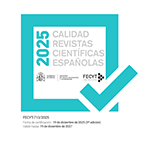Los orígenes de la democracia cristiana y la “tercera vía”: la búsqueda de bien y felicidad comunes en una época de corporativismos
Abstract
Through Giuseppe Toniolo, the Catholic tradition gave rise to Italian Christian Democracy in 1894. He would configure a model on the premises of Rerum Novarum, a recipe for well-being where society and economic science had to be rebuilt on the evangelical foundations, resulting in a third way between liberalism and socialism without class struggle or elements capitalist negatives. Citizenship, commerce, and industry had to function through professional associations, to produce and govern, and Economics would become Social Economics, achieving wealth formation, class harmony and common happiness. However, this world model required a certain authoritarianism to be implemented. This work makes a reflection on this model, contributing elements of its Spanish drift.
Downloads
Article download
License
In order to support the global exchange of knowledge, the journal Iberian Journal of the History of Economic Thought is allowing unrestricted access to its content as from its publication in this electronic edition, and as such it is an open-access journal. The originals published in this journal are the property of the Complutense University of Madrid and any reproduction thereof in full or in part must cite the source. All content is distributed under a Creative Commons Attribution 4.0 use and distribution licence (CC BY 4.0). This circumstance must be expressly stated in these terms where necessary. You can view the summary and the complete legal text of the licence.
Iberian Journal of the History of Economic Thought is an open access journal that does not charge authors for article processing (submission, review or editing) or publication.









